Basic grammar The most important features of Hindi grammar are the conjugations of verbs, and the use of postpositions (the same as prepositions in English, except that they follow the word to which they relate). One of the most important rules of Hindi grammar is that any word that is followed by a postposition cannot influence the conjugation of the verb . Sometimes postpositions in Hindi are implied (that is, not visible). Depending on the word that is being governed by a postposition, its form may have to change when it is followed by a postposition. For example: that
voh
vh those
vo
ve good
acch
aCz; boy (m)
la k
l k;
that good boy
voh acch la k
vh aCz; l k; to that good boy
us acche la ke KO
s aCze l ke ko those good boys
vo acche la ke
ve aCze l ke to those good boys
un acche la k KO
n aCze l ko' ko In the second and fourth examples above the postposition to ko ko appears. Look closely at the changes that have taken place to the words for that/those, good and boy.
These changes tell us whether these words are singular or plural and followed by a postposition or not. Word Order Hindi is a subject-object-verb language (SOV). For example:
| I | read | a | book. | ma | kit b | pa ht | h  . . | mw' ikt;b p t; \) |
| S | V | O | S | O | V |
Nouns All nouns in Hindi are either masculine or feminine. The form of many changes when they are pluralized and when followed by a postposition ( on , at , in , with , etc). How they change depends on the ending of the word and its gender. Nouns are declined according to the following rules.
Masculine Nouns 1. Masculine nouns that end in a; decline in the following manner.  2. All other masculine nouns decline in the following manner.
2. All other masculine nouns decline in the following manner.  Masculine nouns that end in the long vowels and shorten these vowels in the plural form with a postposition, and in the case of , add the semi-vowel y y( before the ending ao' .
Masculine nouns that end in the long vowels and shorten these vowels in the plural form with a postposition, and in the case of , add the semi-vowel y y( before the ending ao' .  3.
3.
There are some a; ending masculine nouns that follow the pattern of (2). These are mainly nouns that signify a relationship and have a reduplicative form as well as some words from Sanskrit. For example: maternal uncle
m m
m;m; paternal uncle
c c
c;c; maternal grandfather
n n
n;n; paternal grandfather
d d
d;d; king
r j
r;j; father
pit
ipt;  Feminine Nouns 1. Feminine nouns that end in i , or iy y; i add y
Feminine Nouns 1. Feminine nouns that end in i , or iy y; i add y  y;\ in plural with no postposition, y yo' in plural with a postposition. shorten to i and add y
y;\ in plural with no postposition, y yo' in plural with a postposition. shorten to i and add y  y;\ in plural with no postposition, y yo' in plural with a postposition.
y;\ in plural with no postposition, y yo' in plural with a postposition.  2.
2.  2.
2.
Feminine nouns ending in any other character are declined simply by adding E\ in the plural form without a postposition, and ao' in the plural with a postposition.  * Feminine words ending in a vowel shorten this vowel before the addition of E\ and ao' in the plural with and without a postposition. Adjectives Adjectives in Hindi must also be declined according to their endings. a; ending adjectives must change for the number, gender and case (occurrence of a postposition) of the noun that follows.
* Feminine words ending in a vowel shorten this vowel before the addition of E\ and ao' in the plural with and without a postposition. Adjectives Adjectives in Hindi must also be declined according to their endings. a; ending adjectives must change for the number, gender and case (occurrence of a postposition) of the noun that follows.  2. red (adj)
2. red (adj)
l l
l;l red book (f)
l l kit b
l;l ikt;b red books (f, pl)
l l kit b
l;l ikt;be' in the red book (f)
l l kit b m
l;l ikt;b me' in the red books (f, pl)
l l kit b m
l;l ikt;bo' me' There are some a; ending adjectives that do not change, and a few where it is up to the speakers discretion. red (adj)
l l
l;l red book (f)
l l kit b
l;l ikt;b red books (f, pl)
l l kit b
l;l ikt;be' in the red book (f)
l l kit b m
l;l ikt;b me' in the red books (f, pl)
l l kit b m
l;l ikt;bo' me' There are some a; ending adjectives that do not change, and a few where it is up to the speakers discretion.
Here is a list of a few of the more common ones. one-and-a-quarter
sav
sv; excellent
ba hiy
bi y; inferior
gha iy
`i$y; unfortunate, unhappy, sad
dukhiy
dui%y; born
paid
pwd; a little
zar
r; alive
zind
i 'd; fresh
t z
t; ;
(This may change according to the speakers discretion.) Pronouns The forms of pronouns also change when they are followed by postpositions. Here is a list of all of possible forms of the pronouns with different postpositions. Postpositions can be made up of a single word (in m me' ) or two or more words (for the sake of ke liye ke ilye ). In some cases, there are variant forms of some of the pronouns with particular postpositions. 
 Many of these postpositions are written together with pronouns in the Devanagari script.
Many of these postpositions are written together with pronouns in the Devanagari script.
They have been written separately in the Roman script to show clearly the form that the pronoun takes. Plural forms of pronouns are used for single people to be polite. There are three second person pronouns. They function in the following manner: you t (sing) tU (intimate): used with animals, small children, god, intimate relations you tum (pl) tum (familiar): used with friends, family, people of same social standing you p a;p (pl) (polite): used for respect with elders and people of higher social standing There are only a few single word postpositions. They are: s k k; to (object marker) ko ko until, by tak tk on, at, in par pr in m me' from, by, since, with se se ergative particle ne ne The majority of postpositions contain more than one word. with ke s th ke s;q for (the sake of) ke liye ke ilye about, concerning ke b re m ke b;re me' ; because of k vajah se kI vjh se Verbs Verbs are conjugated in the various tenses for the number, gender, and person of the subject. with ke s th ke s;q for (the sake of) ke liye ke ilye about, concerning ke b re m ke b;re me' ; because of k vajah se kI vjh se Verbs Verbs are conjugated in the various tenses for the number, gender, and person of the subject.
The verbal system is based on two participles: the imperfect participle (action imperfect, or incomplete) the perfect participle (action perfect, or complete) These participles are effectively a; ending adjectives. (See above how adjectives function.) They are formed in the following manner: Imperfect participle: stem of a verb + t /te/t + t;tetI For example: to speak boln (infinitive)


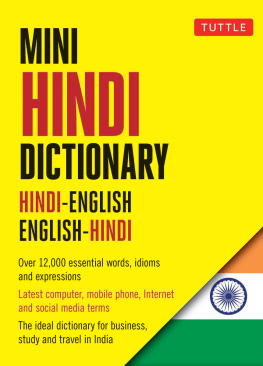
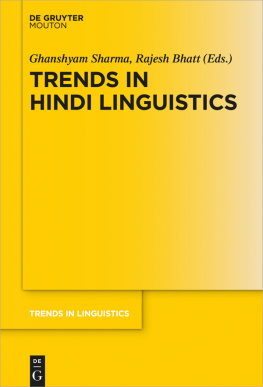
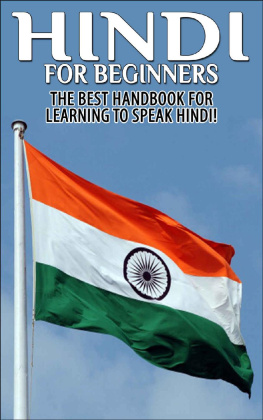


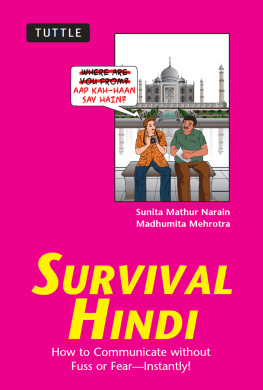
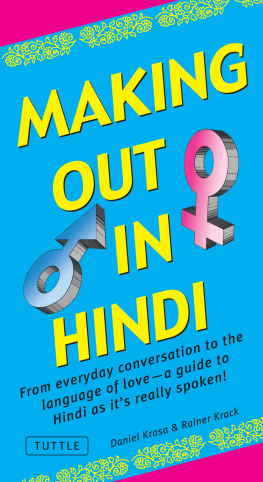



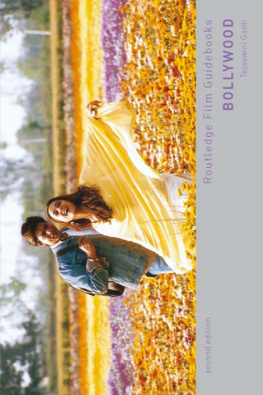

 .
. 2. All other masculine nouns decline in the following manner.
2. All other masculine nouns decline in the following manner.  Masculine nouns that end in the long vowels and shorten these vowels in the plural form with a postposition, and in the case of , add the semi-vowel y y( before the ending ao' .
Masculine nouns that end in the long vowels and shorten these vowels in the plural form with a postposition, and in the case of , add the semi-vowel y y( before the ending ao' .  3.
3. Feminine Nouns 1. Feminine nouns that end in i , or iy y; i add y
Feminine Nouns 1. Feminine nouns that end in i , or iy y; i add y  y;\ in plural with no postposition, y yo' in plural with a postposition. shorten to i and add y
y;\ in plural with no postposition, y yo' in plural with a postposition. shorten to i and add y  2.
2.  * Feminine words ending in a vowel shorten this vowel before the addition of E\ and ao' in the plural with and without a postposition. Adjectives Adjectives in Hindi must also be declined according to their endings. a; ending adjectives must change for the number, gender and case (occurrence of a postposition) of the noun that follows.
* Feminine words ending in a vowel shorten this vowel before the addition of E\ and ao' in the plural with and without a postposition. Adjectives Adjectives in Hindi must also be declined according to their endings. a; ending adjectives must change for the number, gender and case (occurrence of a postposition) of the noun that follows.  2. red (adj)
2. red (adj)
 Many of these postpositions are written together with pronouns in the Devanagari script.
Many of these postpositions are written together with pronouns in the Devanagari script.